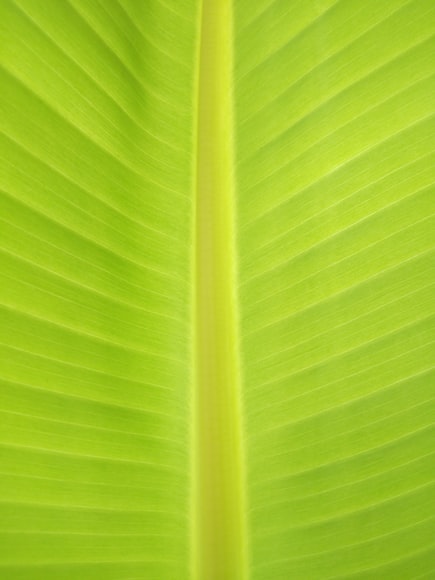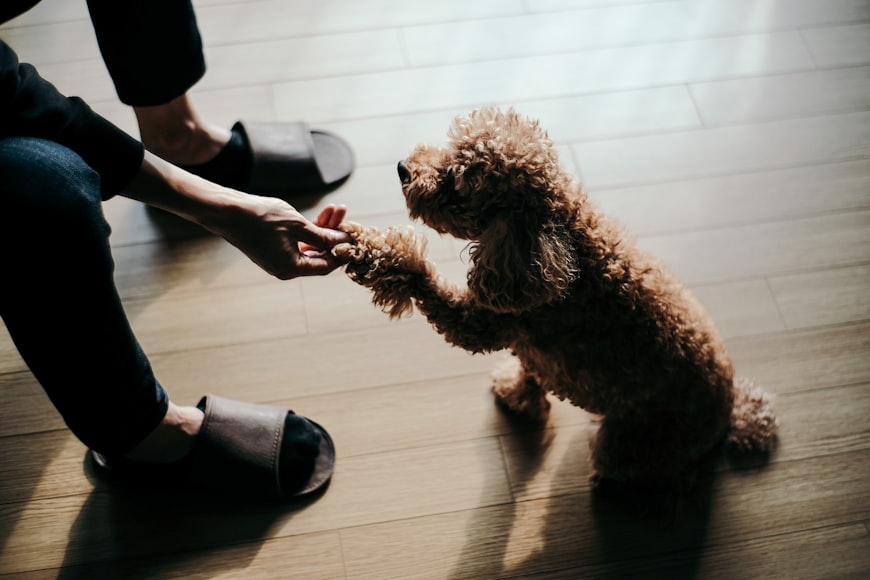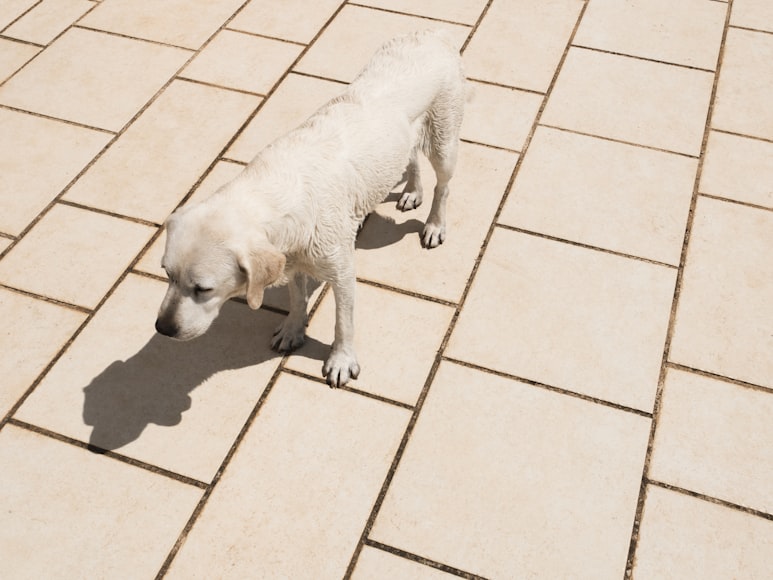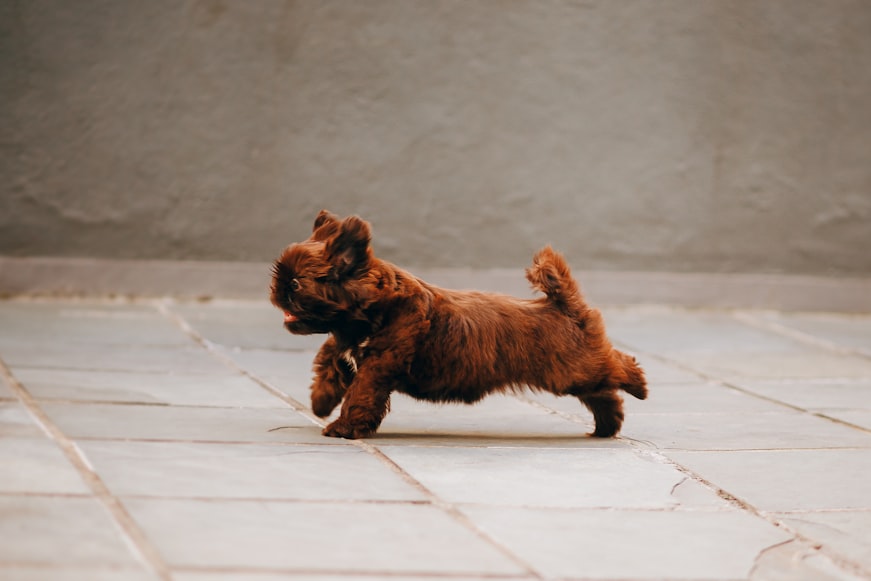French Bulldog Paw Licking: An Outline of Causes and Solutions

As French bulldog owners, it’s not uncommon to witness our furry companions engaged in the act of paw licking. While occasional licking is normal, excessive or persistent paw licking can indicate underlying health issues that require attention. Understanding the various causes and potential solutions is crucial for ensuring the well-being of our precious Frenchies.
Causes of Paw Licking in French Bulldogs
- Allergies: Allergies to environmental allergens, such as pollen, dust, or food, can trigger inflammation and itchiness in the paws, leading to excessive licking.
- Skin infections: Bacterial or yeast infections can cause skin irritation and discomfort, prompting paw licking as a way to soothe the affected area.
- Parasites: Fleas, ticks, or mites can burrow into the skin, causing irritation and itching that may lead to paw licking.
- Hormonal imbalances: Hypothyroidism, a condition caused by insufficient thyroid hormone production, can result in dry, itchy skin that makes paws prone to licking.
- Anxiety or stress: Nervous or anxious dogs may resort to paw licking as a coping mechanism to calm themselves.
- Pain: Underlying pain in the paw or elsewhere in the body can trigger compensatory licking as a way to relieve discomfort.
- Boredom: Bored or lonely dogs may engage in self-soothing behaviors like paw licking.
- Nutritional deficiencies: Deficiencies in essential nutrients, such as fatty acids, can contribute to dry, itchy skin that predisposes dogs to paw licking.
Solutions for Paw Licking
The best approach to addressing paw licking in French bulldogs involves a combination of identifying and treating the underlying cause.
- Veterinary consultation: It’s essential to schedule a veterinary consultation to determine the underlying cause of paw licking. Your veterinarian will perform a thorough physical examination, review your dog’s medical history, and may recommend diagnostic tests.
- Treatment of underlying conditions: Once the cause is identified, appropriate treatment will be prescribed. This may include medications for allergies, antibiotics for infections, flea or tick prevention, or hormonal therapy for hypothyroidism.
- Environmental modifications: If allergies are suspected, identifying and minimizing exposure to potential allergens is crucial. Air purifiers, regular house cleaning, and avoidance of outdoor areas during high pollen seasons can be helpful.
- Anti-itching creams or sprays: Veterinary-approved anti-itching creams or sprays can provide relief from skin irritation and reduce the urge to lick.
- Behavioral management: For anxiety-related paw licking, behavior modification techniques can be employed, such as providing plenty of mental and physical stimulation, creating a calm and consistent environment, and using calming aids like pheromone diffusers.
- Protective boots or wraps: In some cases, protective boots or wraps can be used to prevent further damage to the paws and discourage licking.
Prevention
In addition to addressing paw licking symptoms, implementing preventive measures can help reduce the likelihood of recurrence.
- Regular grooming: Regular brushing and nail trimming help maintain healthy skin and prevent dirt and allergens from accumulating on the paws.
- Balanced diet: Feeding a nutritionally balanced diet rich in essential fatty acids supports healthy skin and reduces predispositions to dryness and itchiness.
- Environmental cleanliness: Maintaining a clean living environment by regularly vacuuming and disinfecting surfaces can minimize exposure to allergens and parasites.
- Stress management: Providing plenty of exercise, companionship, and mental stimulation helps keep French bulldogs happy and reduces stress-related anxiety.
By understanding the various causes and solutions for paw licking in French bulldogs, we can effectively address this issue and ensure the comfort and well-being of our beloved companions. Remember, if you notice excessive or persistent paw licking, seeking veterinary attention is crucial to ensure timely diagnosis and appropriate treatment.
Identify Underlying Medical Conditions:

As a dog pet blogger, you undoubtedly know that paw licking is a common behavior in French Bulldogs. While occasional paw licking is normal, excessive or persistent licking can indicate an underlying medical condition. Here’s a comprehensive guide to help you identify the potential causes of paw licking in your beloved Frenchie:
1. Allergies
Allergies, both environmental and food-related, can cause intense itching and irritation, leading to excessive paw licking. Common allergens include pollen, dust, mold, certain foods, and even flea saliva. Symptoms of allergies in French Bulldogs may include:
- Sneezing
- Itchy skin
- Hair loss
- Red, inflamed paws
2. Parasites
Fleas, ticks, and mites can cause severe itching and allergic reactions, resulting in paw licking. These parasites can infest your dog’s skin, hair follicles, and paws, causing significant discomfort. Signs of parasites in French Bulldogs include:
- Visible fleas or ticks
- Scratching
- Scabbing
- Hair loss around the paws or other affected areas
3. Skin Infections
Bacterial or fungal infections can cause intense itching and soreness on your dog’s paws. These infections can develop due to various factors, such as allergies, moisture, or trauma. Symptoms of skin infections in French Bulldogs may include:
- Red, swollen paws
- Discharge or pus
- Crusty or flaky skin
- Bad odor
4. Nail or Paw Injuries
Minor injuries to the nails or paws, such as cuts, cracks, or ingrown nails, can cause pain and discomfort, leading to excessive paw licking. These injuries can occur during walks, playtime, or even grooming. Signs of nail or paw injuries in French Bulldogs include:
- Limping
- Swelling
- Bleeding
- Visible injuries to the nails or paws
Diagnosing the Underlying Cause
To effectively treat paw licking in your French Bulldog, it’s crucial to identify the underlying medical condition. Here’s what you can do:
- Physical Examination: Your veterinarian will perform a thorough physical examination to check for any visible signs of allergies, parasites, or skin infections.
- Bloodwork and Tests: If necessary, blood tests, skin scrapings, or nail clippings may be performed to confirm an allergy, parasite infestation, or infection.
- Elimination Diet: If an allergy is suspected, your veterinarian may recommend an elimination diet to identify the specific allergen triggering the paw licking.
Treatment Options
Once the underlying medical condition is diagnosed, treatment can begin. Treatment options may include:
- Allergy Management: Antihistamines, corticosteroids, or allergy shots can help control allergy symptoms and reduce paw licking.
- Parasite Control: Topical or oral medications can effectively eliminate fleas, ticks, or mites.
- Antibiotic or Antifungal Medications: Antibiotics or antifungal medications can treat skin infections and reduce itching.
- Pain Management: If paw licking is caused by pain or discomfort, your veterinarian may prescribe pain relievers or anti-inflammatory medications.
- Nail Care: Trimming or filing your dog’s nails regularly can prevent injuries and reduce discomfort.
Conclusion
Excessive paw licking in French Bulldogs can be a sign of an underlying medical condition. By understanding the potential causes and seeking veterinary care promptly, you can help alleviate your dog’s discomfort and ensure their overall health and well-being. Remember, early diagnosis and treatment are crucial for effective management of paw licking and preventing complications.
Rule Out Environmental Irritants:
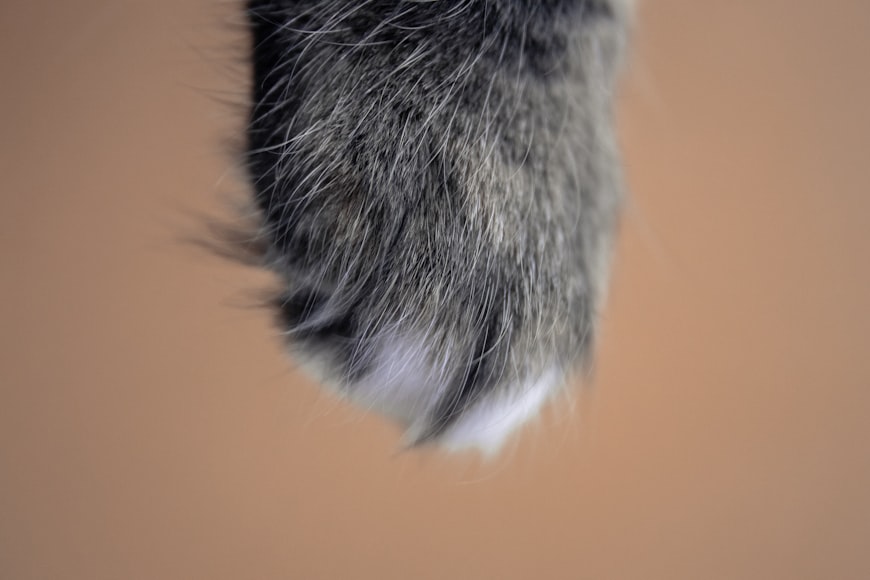
Paw licking is a common behavioral issue in dogs, including the adorable French bulldog. While excessive paw licking can sometimes indicate an underlying medical condition, it’s crucial to rule out any potential environmental irritants that may be triggering this behavior.
Contact Allergies
French bulldogs, like all dogs, can develop contact allergies to various substances in their environment. These allergens can be found in:
- Carpets and rugs treated with chemical cleaners
- Grass or outdoor surfaces exposed to pesticides
- Certain fabrics, such as wool or synthetic materials
If your Frenchie’s paws come into contact with an allergen, they may experience irritation, itching, and discomfort, leading to excessive licking as a means of self-soothing.
Rough Surfaces
Rough surfaces can also irritate a French bulldog’s delicate paw pads. This can include:
- Concrete sidewalks
- Gravel or uneven terrain
- Dirt and sand
Walking on these surfaces for extended periods can cause abrasions, cracks, and other injuries, prompting your dog to lick their paws to reduce pain and discomfort.
Chemical Spills
Accidental chemical spills in the home or outdoors can have severe consequences for your French bulldog. If your dog’s paws come into contact with toxic substances, such as:
- Antifreeze
- Bleach
- Insecticides
they can experience burns, rashes, and other skin irritation, leading to excessive paw licking and potential medical emergencies.
How to Rule Out Environmental Irritants
To rule out environmental irritants as the cause of your French bulldog’s paw licking, follow these steps:
- Change your dog’s environment: Move them to a different room or area with different flooring and furnishings.
- Cover surfaces: Use rugs or carpets to cover rough surfaces that could irritate their paws.
- Check for spills: Inspect your home and yard for any potential chemical spills or leaks.
- Avoid treated surfaces: Keep your dog off lawns or areas that have been treated with pesticides or herbicides.
- Use protective gear: Consider using paw protectors or boots when taking your dog on walks, especially on rough terrain.
If the problem persists…
If you have ruled out environmental irritants and your French bulldog’s paw licking continues, it’s essential to consult with your veterinarian. There may be an underlying medical condition, such as an allergy, infection, or hormonal imbalance, that is causing the behavior.
Conclusion
Paw licking in French bulldogs can be a frustrating issue for both the dog and their owner. By ruling out environmental irritants, you can determine whether there are external factors contributing to the behavior. If environmental factors are not the cause, further investigation may be necessary to identify any underlying medical conditions that may require treatment.
Examine Paw Anatomy:
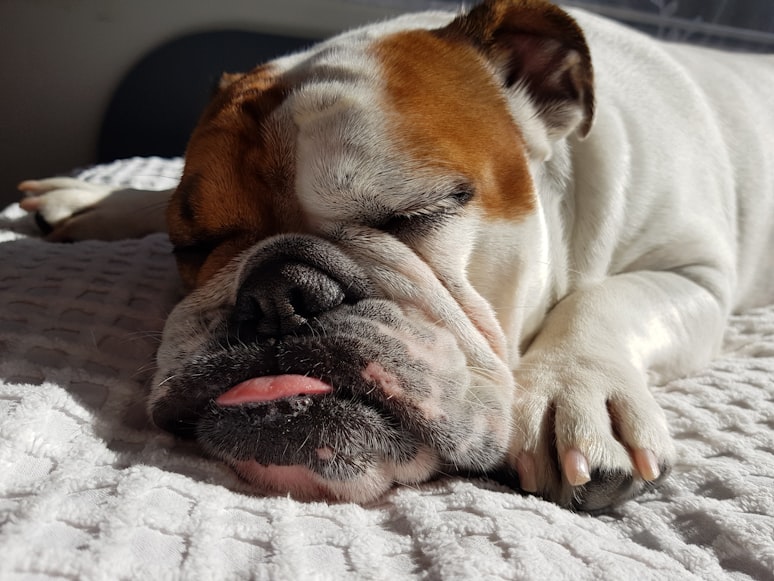
As pet owners, we often observe our furry companions engaging in various behaviors, including licking their paws. While this activity can be harmless in moderation, excessive paw licking may indicate underlying health concerns. In this article, we’ll delve into the anatomy of a French bulldog’s paw to shed light on the potential causes of paw licking and how to address them.
Paw Anatomy: A Close-Up View
A dog’s paw consists of four main parts:
- Paw Pad: The fleshy cushion on the bottom of the paw that provides cushioning and protects bones and tendons.
- Toenails: Hard, keratinized structures that help with traction and provide support.
- Interdigital Spaces: The areas between the toes, which are covered in skin and fur.
- Sweat Glands: Found on the paw pads, they secrete sweat to keep the paw cool and prevent dryness.
Potential Causes of Paw Licking
1. Ingrown Toenails:
Ingrown toenails occur when the nail grows inward instead of outward. This can be painful and cause inflammation or infection in the surrounding tissue. Paw licking provides temporary relief from the discomfort, but it can worsen the condition if not addressed promptly.
2. Interdigital Cysts:
These are fluid-filled sacs that develop between the toes. They can be caused by allergies, trauma, or bacterial infections. Cysts can itch and cause discomfort, leading to paw licking.
3. Yeast Overgrowth:
Malassezia is a type of yeast that normally lives on the skin in small amounts. However, an overgrowth of Malassezia can lead to redness, itching, and paw licking. Allergies or a weakened immune system can contribute to yeast overgrowth.
4. Other Causes:
Paw licking can also be a symptom of other underlying conditions, such as:
- Allergies (environmental or food)
- Parasites (fleas, ticks, mites)
- Anxiety or stress
- Skin infections (bacterial or fungal)
Diagnosis and Treatment
If your French bulldog is excessively licking its paws, it’s crucial to consult a veterinarian for proper diagnosis and treatment. The veterinarian will examine your dog’s paws, perform tests (e.g., nail clipping, skin scraping), and ask about your dog’s medical history.
Treatment for paw licking depends on the underlying cause:
- Ingrown Toenails: The veterinarian may trim or remove the ingrown nail.
- Interdigital Cysts: Cysts may be drained and treated with antibiotics if infected.
- Yeast Overgrowth: Anti-fungal medications can help control yeast overgrowth.
- Other Causes: Treatment will vary depending on the specific underlying condition.
Prevention and Management
Regular nail trims and paw checks can help prevent ingrown toenails and other paw problems. Keep the interdigital spaces clean and dry, especially after walks or baths. If your dog has allergies, manage them by avoiding allergens and providing appropriate medications. Reducing stress levels through exercise, enrichment activities, and a calming environment can help prevent anxiety-related paw licking.
Conclusion
Excessive paw licking in French bulldogs can be a sign of various underlying health concerns. By understanding the anatomy of a dog’s paw and recognizing potential causes, you can work with your veterinarian to properly diagnose and treat your furry friend. With appropriate care, you can help prevent and manage paw licking, ensuring the well-being and comfort of your beloved pet.
Check for Anxiety or Boredom:
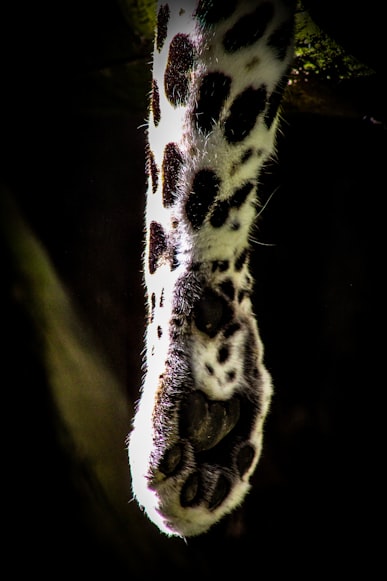
French Bulldogs, known for their comical expressions and affectionate nature, can often exhibit a peculiar and concerning behavior: paw licking. While it’s natural for dogs to groom themselves occasionally, excessive or repetitive paw licking can signal underlying issues that require attention.
Anxiety: A Driving Force for Paw Licking
Anxiety, a common problem among French Bulldogs, can manifest itself in a variety of ways, including paw licking. When a dog experiences anxiety, it may resort to repetitive licking as a coping mechanism to relieve stress and calm itself. This behavior can become a self-soothing ritual that, if left unchecked, can lead to skin irritation, sores, and even infections.
Boredom: A Trigger for Paw Licking
Another contributing factor to excessive paw licking in French Bulldogs is boredom. Dogs that are not provided with sufficient mental and physical stimulation may turn to paw licking as a way to entertain themselves. Like anxiety, boredom-related paw licking can become a habit and result in health problems if not addressed.
How to Address Anxiety-Induced Paw Licking
If you suspect your French Bulldog’s paw licking stems from anxiety, it’s crucial to seek professional help from a veterinarian or certified dog behaviorist. They can accurately assess your dog’s anxiety levels and develop an individualized treatment plan tailored to its specific needs.
While professional intervention is essential, there are additional measures you can take at home to reduce your dog’s anxiety and mitigate paw licking:
- Provide a safe and stress-free environment: Create a designated “safe space” for your dog where it feels comfortable and undisturbed. This space should be away from high-traffic areas and loud noises.
- Establish a regular routine: Consistency and predictability can help reduce anxiety in dogs. Stick to a set feeding, walking, and playtime schedule as much as possible.
- Engage in interactive play: Play sessions not only provide mental stimulation but also strengthen the bond between you and your dog. Choose toys and activities that are appropriate for your dog’s age and energy level.
- Consider calming aids: If your dog’s anxiety is severe, your veterinarian may recommend calming aids such as pheromone diffusers or anxiety wraps to help reduce stress levels.
Combating Boredom-Related Paw Licking
Addressing boredom-related paw licking requires providing your dog with adequate mental and physical enrichment:
- Increase physical activity: Ensure your dog gets at least 30 minutes of moderate exercise each day. This can include walks, runs, or playtime in the backyard.
- Offer interactive toys: Provide your dog with a variety of toys that encourage mental stimulation, such as puzzle feeders, treat-dispensing toys, and interactive chews.
- Engage in training sessions: Training sessions not only help with obedience but also provide mental exercise. Teach your dog basic commands, tricks, or even new games.
- Consider doggy daycare: If you work long hours or cannot provide your dog with sufficient attention during the day, consider enrolling it in doggy daycare. This allows your dog to socialize with other dogs and engage in supervised play.
When to Seek Professional Help
While most cases of paw licking can be managed with home remedies, it’s essential to seek professional help if your dog’s paw licking persists, worsens, or is accompanied by other unusual behaviors. A veterinarian can rule out any underlying medical conditions and provide appropriate treatment or guidance.
Conclusion
Paw licking in French Bulldogs can be a sign of underlying anxiety or boredom. By understanding the potential causes and implementing appropriate interventions, you can help reduce your dog’s paw licking behavior and promote its overall health and well-being. Remember, consistency, patience, and professional guidance are key to successfully addressing this issue and preventing future complications.
Consider Pain or Discomfort:
French bulldogs, with their adorable expressions and wrinkly faces, are a popular breed. However, like any breed, they can experience health issues. One common problem is excessive paw licking, which can signal underlying pain or discomfort. Here’s a comprehensive guide to help you understand the possible reasons why your French bulldog is licking its paws:
Consider Pain or Discomfort:
1. Arthritis:
As French bulldogs age, they can develop arthritis, a condition that causes inflammation and pain in the joints. Arthritis can make it difficult for your dog to walk or stand, leading to paw licking as a way to soothe the discomfort.
2. Nerve Damage:
Nerve damage can result from various incidents, such as trauma, surgery, or spinal cord injuries. Damaged nerves can cause pain, numbness, or tingling in the affected area, which can prompt your dog to lick its paw to relieve the sensation.
3. Pain in the Paw or Leg:
Foreign objects, such as splinters or thorns, can penetrate the paw and cause pain. Also, injuries to the paw pads, bones, or tendons can trigger paw licking as a means of coping with the discomfort.
Consider Allergies or Skin Problems:
1. Allergic Reactions:
French bulldogs can develop allergies to food, environmental allergens, or certain materials. These allergies can cause skin irritation, itching, and discomfort, leading to excessive paw licking as your dog tries to soothe the affected area.
2. Skin Infections:
Bacterial or fungal infections can cause skin irritation, inflammation, and itching. Your dog may lick its paws to relieve the discomfort and to clean the affected area.
Consider Behavioral or Psychological Factors:
1. Boredom or Anxiety:
A bored or anxious dog may resort to paw licking as a way to relieve stress or occupy their time. Paw licking can become a self-soothing mechanism, especially if your dog lacks adequate exercise or mental stimulation.
2. Obsessive-Compulsive Disorder (OCD):
In some cases, excessive paw licking can be a symptom of obsessive-compulsive disorder (OCD). OCD is a mental health condition that can manifest in repetitive behaviors, such as excessive grooming.
How to Address Paw Licking:
If you notice your French bulldog licking its paws excessively, it’s important to determine the underlying cause. Consult with your veterinarian to rule out any medical conditions or allergies. Once the cause is identified, your veterinarian will recommend an appropriate treatment plan.
Treatment may include:
- Pain medication for arthritis or nerve damage
- Antihistamines or allergy shots for allergic reactions
- Antibiotics or antifungal medication for skin infections
- Behavioral modification techniques to address boredom or anxiety
- Therapy or medication for obsessive-compulsive disorder
Prevention:
Preventing paw licking in French bulldogs can be achieved by:
- Providing regular exercise and mental stimulation to prevent boredom
- Keeping your dog’s environment clean and free from allergens
- Inspecting your dog’s paws regularly for injuries or foreign objects
- Consulting with your veterinarian for early detection and treatment of any underlying medical conditions
Conclusion:
Paw licking in French bulldogs can signal a range of underlying issues, from pain and discomfort to allergies or behavioral problems. It’s important to seek veterinary attention to determine the cause and implement the appropriate treatment plan. By understanding the potential reasons behind your dog’s paw licking, you can help ensure their health and well-being.
Inspect for Pica:
Paw licking is a common behavior in dogs, and while it can be a sign of allergies or other skin irritations, it can also be a sign of a more serious medical condition known as pica.
What is Pica?
Pica is an eating disorder characterized by the compulsive ingestion of non-food items, such as dirt, fabric, or plastic. While it is more common in puppies and young dogs, it can affect dogs of any age.
Causes of Pica in French Bulldogs:
The exact cause of pica in French Bulldogs is unknown, but several factors may contribute to its development, including:
- Nutritional deficiencies: A lack of essential nutrients, such as vitamins or minerals, can lead to pica as the dog attempts to supplement its diet.
- Medical conditions: Underlying health problems, such as digestive disorders, hormonal imbalances, or parasites, can cause pica as a symptom.
- Behavioral issues: Anxiety, boredom, or stress can lead to pica as a coping mechanism.
Symptoms of Pica in French Bulldogs:
The main symptom of pica is the consumption of non-food items. Other signs that may indicate pica include:
- Paw licking
- Dirt-eating
- Coprophagy (eating feces)
- Vomiting or diarrhea
- Lethargy
- Weight loss
Inspecting for Pica in French Bulldogs:
If you suspect your French Bulldog may be exhibiting pica, it is crucial to take them to the veterinarian for a thorough examination. The veterinarian will perform a physical exam, review your dog’s history, and run tests to rule out any underlying medical conditions or behavioral issues that may be causing the pica.
Steps to Take if Your Dog Has Pica:
If your veterinarian diagnoses your dog with pica, they will recommend the best course of treatment based on the underlying cause. Some steps you may need to take include:
- Address nutritional deficiencies: If your dog’s pica is caused by a nutritional deficiency, the veterinarian will recommend a diet that supplements the missing nutrients.
- Treat underlying medical conditions: If a medical condition is causing your dog’s pica, the veterinarian will treat the underlying condition to eliminate the symptoms of pica.
- Manage behavioral issues: If your dog’s pica has a behavioral basis, the veterinarian may recommend behavioral therapy or training to address the anxiety, boredom, or stress that is triggering the behavior.
Preventing Pica in French Bulldogs:
While pica can be a challenging condition to manage, there are steps you can take to prevent it from developing in your French Bulldog:
- Provide a healthy diet: Feed your dog a nutritious diet that meets their specific needs.
- Rule out underlying medical conditions: Have your veterinarian check your dog for any underlying medical conditions that may contribute to pica.
- Enrich your dog’s environment: Provide plenty of toys, exercise, and mental stimulation to prevent boredom and anxiety.
- Manage stress: Identify and address any stressors in your dog’s life, such as separation anxiety or loud noises.
If you notice your French Bulldog licking its paws excessively or engaging in other behaviors that may indicate pica, don’t hesitate to consult with your veterinarian. Early diagnosis and treatment can help prevent serious health problems and ensure your dog’s well-being.
Analyze Paw Hygiene:
Introduction
French Bulldogs, with their endearing and playful personalities, are beloved companions for many dog owners. However, one common issue that affects this breed is excessive paw licking. While occasional paw licking is normal grooming behavior, persistent or excessive licking can indicate underlying health problems or hygiene concerns. This article will delve into the causes of French bulldog paw licking and provide comprehensive guidance on maintaining optimal paw hygiene to prevent this behavior.
Causes of French Bulldog Paw Licking
- Allergies: French Bulldogs can be prone to allergies, which can cause irritation of the skin, including the paws. Allergies can be triggered by various allergens, such as food, environmental factors, or parasites.
- Dermatitis: This condition refers to inflammation of the skin, which can also cause itching and irritation of the paws. Dermatitis can be caused by allergies, infections, or other underlying health issues.
- Infections: Bacterial or yeast infections on the paws can lead to discomfort and excessive licking. These infections can be caused by cuts, scrapes, or exposure to moisture.
- Dry or cracked paws: Cracked or dry paws can be irritating and painful, causing dogs to lick their paws to relieve the discomfort. This can lead to a cycle of licking and further drying, worsening the problem.
- Stress or anxiety: Some dogs engage in excessive paw licking as a way to cope with stress or anxiety. This behavior can become a compulsive habit.
- Foreign objects: Paw licking can be a sign that the dog has a foreign object stuck between their toes or in their paw pad. Objects such as thorns, burrs, or pieces of glass can cause irritation and pain.
Analyze Paw Hygiene
Maintaining good paw hygiene is crucial for preventing excessive licking and ensuring your French bulldog’s overall health. Here are some essential steps:
Regular Grooming and Cleaning
- Check your dog’s paws regularly for any signs of redness, swelling, or irritation.
- Wipe down their paws with a damp cloth or use a gentle pet-safe cleanser to remove dirt or debris.
- Pay attention to the areas between the toes and the paw pads, where debris can accumulate.
Trimming Nails
- Overgrown nails can put unnecessary pressure on the paws and cause discomfort.
- Trim your dog’s nails regularly to ensure they are a suitable length and do not cause any discomfort while walking or running.
Prevention of Dry or Cracked Paws
- Dry or cracked paws can be prevented by using a paw balm or moisturizer specifically designed for dogs.
- After bathing your dog, make sure to thoroughly dry their paws to prevent moisture from causing irritation or infections.
Addressing Underlying Health Issues
If you notice excessive paw licking in your French bulldog, it is essential to consult with your veterinarian to determine the underlying cause. Your veterinarian will perform a thorough examination and may recommend tests to diagnose any allergies, infections, or other health conditions that may be contributing to the licking behavior.
Behavioral Modification
If stress or anxiety is determined to be a factor in your dog’s paw licking, it is important to provide them with a calm and stress-free environment. Engage in regular exercise, provide mental enrichment activities, and consider pheromone diffusers or calming supplements to help reduce their anxiety levels.
Additional Tips
- Use safe and non-toxic cleaning products when cleaning your dog’s paws.
- Avoid using human products, as they may contain chemicals that can irritate your dog’s skin.
- Keep your dog’s paws free from snow and ice during cold weather to prevent dryness and cracking.
- Provide your dog with a soft and comfortable bed to rest on, as hard surfaces can put strain on their paws.
Conclusion
French bulldog paw licking can be a common issue, but it is essential to address the underlying cause to prevent discomfort and potential health problems. By following the comprehensive paw hygiene guidelines outlined in this article, maintaining your dog’s paws clean and healthy, and seeking veterinary attention for any underlying health concerns, you can help reduce excessive paw licking and ensure the overall well-being of your beloved French Bulldog. Remember, a happy and healthy dog is also a content and comfortable dog.
Consult with a Veterinarian:
French Bulldogs are known for their adorable wrinkly faces and playful personalities, but they are also prone to certain health issues, including excessive paw licking. While occasional paw licking is normal grooming behavior, persistent or excessive licking can indicate underlying medical conditions or behavioral problems.
Causes of Paw Licking
Medical Causes:
- Allergies (Atopy or Food): Allergies to environmental allergens or certain foods can cause intense itching on the paws, leading to excessive licking.
- Dermatitis: Skin inflammation caused by allergies, infections, or underlying conditions can also trigger paw licking.
- Bacterial or Fungal Infections: Infections between the toes or in the nail beds can cause pain and discomfort, resulting in licking.
- Parasites: Fleas, ticks, or mites can bite the paws and cause irritation, leading to licking.
- Joint Pain: Arthritis or other joint pain can make it uncomfortable for dogs to walk, causing them to lick their paws to relieve discomfort.
Behavioral Causes:
- Boredom or Anxiety: Paw licking can be a way for dogs to cope with boredom, stress, or anxiety.
- Compulsive Behavior: Some dogs develop compulsive paw licking as a way to self-soothe or as a response to stress.
- Attention-Seeking: Dogs may lick their paws to get attention from their owners.
Diagnosis and Treatment
If your French Bulldog is excessively licking its paws, it’s essential to consult with a veterinarian to rule out underlying medical conditions. The veterinarian will perform a physical examination, ask about your dog’s history, and may recommend diagnostic tests such as:
- Skin scraping or biopsy: To identify any skin conditions
- Cytology: To check for infections
- Allergies testing: To determine if your dog is allergic to certain allergens
- Radiographs: To evaluate for joint issues
Treatment options will vary depending on the underlying cause:
-
Medical Conditions:
-
Antihistamines or corticosteroids for allergies
- Antibiotics or antifungals for infections
-
Pain medication for joint pain
-
Behavioral Causes:
-
Behavioral modification therapy to address boredom or anxiety
- Anti-anxiety medication in severe cases
- Physical exercise and mental stimulation to provide enrichment
Other Recommendations:
- Keep your dog’s paws clean and dry. Wipe them down with a damp cloth after walks to remove any allergens or irritants.
- Use paw protectors. Apply paw balm or wax to protect the paws from chapping or irritation.
- Trim your dog’s nails. Long nails can irritate the toe pads and lead to licking.
- Provide plenty of enrichment. Engage your dog in regular play, training, and interactive toys.
- Consider a muzzle. In extreme cases, a muzzle can prevent your dog from licking its paws excessively.
Prevention:
While not all causes of paw licking can be prevented, there are some steps you can take to reduce the risk:
- Control allergies. Identify and avoid allergens that trigger your dog’s itching.
- Promote skin health. Bathe your dog regularly and use hypoallergenic shampoo.
- Keep your dog active and engaged. Provide plenty of physical exercise and mental stimulation.
- Avoid excessive grooming. Over-bathing or brushing can irritate the skin.
- Regular veterinary checkups. Early detection and treatment of underlying medical conditions can help prevent excessive paw licking.
Excessive paw licking in French Bulldogs can be a sign of underlying medical conditions or behavioral issues. By consulting with a veterinarian, you can determine the cause and receive appropriate treatment. With proper diagnosis and care, you can help your furry friend overcome this annoying and potentially harmful habit.






